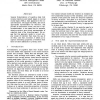Free Online Productivity Tools
i2Speak
i2Symbol
i2OCR
iTex2Img
iWeb2Print
iWeb2Shot
i2Type
iPdf2Split
iPdf2Merge
i2Bopomofo
i2Arabic
i2Style
i2Image
i2PDF
iLatex2Rtf
Sci2ools
101
click to vote
IJCAI
1993
1993
A Representationalist Theory of Intention
Several formalizations of cognitive state that include intentions and beliefs based on normal modal logics (NMLs) have appeared in the recent literature. We argue that NMLs are not an appropriate representation for intention, and provide an alternative model, one that is representationalist, in the sense that its semantic objects provide a more direct representation of cognitive state of the intending agent. We argue that this approach results in a much simpler model of intention than does the use of an NML, and that, moreover, it allows us to capture interesting properties of intention that have not been addressed in previous work
Related Content
| Added | 02 Nov 2010 |
| Updated | 02 Nov 2010 |
| Type | Conference |
| Year | 1993 |
| Where | IJCAI |
| Authors | Kurt Konolige, Martha E. Pollack |
Comments (0)

